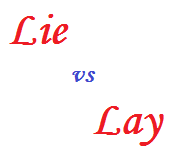How to Know the Difference Between Lie and Lay

<font size="5">I</font>t is not that these two words are from very different roots. In contrast to many English words, which are from Latin/French origin, both words are from the Old English (Germanic) root licgan, which means a sleeping place. The word lair is also from the same root. Differentiating usage of lie and lay sometimes becomes difficult. Another word lie meaning false claim which is completely from a different root, adds to the difficulty.
Steps
- Know that lay is a regular verb; that is, it is easy to remember its past and perfect participle.
- Past participle : Laid.
- Perfect participle : Laid.
- Gerund : Laying
- Past participle : Laid.
- Contrast lie as an irregular verb; that is, one should memorise its past and perfect participle.
- Past participle : Lay.
- Perfect participle : Lain.
- Gerund : Lying
- Past participle : Lay.
- Keep in mind that Lay is a transitive verb; that is, it needs an object to act on.
- I laid my head on the desk for a minute. (lay, laid, laid, laying)
- I laid the book on the floor. (lay, laid, laid, laying)
- I laid my head on the desk for a minute. (lay, laid, laid, laying)
- Remember, though, that lie is intransitive; that is, it does not need an object. Not only it does not need an object but that it does not accept an object to act on.
- His noble head had lain on the pillow, talking calmly. (lie, lay, lain, lying)
- I lay on the sandy ground and gazed at stars. (lie, lay, lain, lying)
- His noble head had lain on the pillow, talking calmly. (lie, lay, lain, lying)
- Contrast lie meaning to say something false. It is a regular verb; that is, it is easy to remember its past and perfect participle.
- Past participle : Lied.
- Perfect participle : Lied.
- Gerund : Lying
- Subjective noun : Liar
- Past participle : Lied.